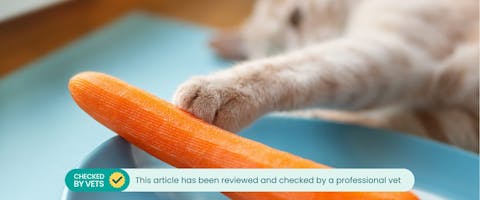Updated 23/02/2024
Legend has it that carrots can help you see in the dark (not that our feline friends need any help in that department). While we're not 100% sold on the science of that particular school of thought, carrots are a great source of vitamins and are packed full of health benefits.
But here’s a question: can cats eat carrots, and do these brightly-colored vegetables hold the same health benefits for our kitty companions as they do for us? Read on as we explore just that…
Trending posts
Purr-use some of the top blogs our members have been loving this month- Top male dog names for your new furry friendGot a new furry family member in your pack? Check…

- Top female dog names for your new fluffy palWelcoming a new pooch into your family? Explore…

- 120+ gray cat names your silver feline will loveRecently welcomed a fluffy gray bundle of joy into…

- What are normal pet sitting rates?Discover the average pet sitting rates for animals…

- Unique dog names to stand out from the packDare to be different with our list of the best…

Can cats eat carrot?
Technically, yes! Cooked carrots are one of the vegetables that are perfectly safe for cats to eat. That said, cats are obligate carnivores - meaning they require meat in their diet and should get the majority of their nutritional needs met from animal protein. Carrots are not typically a natural part of their diet, plus the sugars in carrots can lead to digestive issues over time. So, it's best to keep your kitty's carrot consumption to small amounts, fed in moderation, and avoid feeding them altogether if your kitty has a history of bladder stones or crystals in their urine.
Can cats eat cooked carrots?
Yes, in fact, cooking carrots is the recommended way to feed your cat carrots, if you are planning on doing so. Just be sure to keep them plain and free of any seasonings, spices, butter, or oil. Seasonings can be unhealthy and some may contain ingredients that are toxic to cats.
Can cats eat raw carrots?
It's not recommended for cats to eat raw carrots - uncooked carrots are pretty hard, and could pose a choking hazard.
Can cats eat carrot cake?
No! While we humans may love nothing more than a tasty slice o' carrot cake and a coffee to beat that mid-afternoon slump, carrot cake is not suitable for cats as it is high in calories and contains large amounts of sugar and fat - which, suffice to say, isn't part of a healthy cat's diet.
Are carrots good for cats?
Carrots are rich in nutrients, vitamins, and minerals, such as Vitamin C, A, K, Potassium, and Calcium - to name a few. All of these can help contribute to your cat's immune system and general bill of health. That said, carrots are high in sugar which, if consumed in large quantities, can lead to digestive issues as well as obesity and diabetes.
Cats require particular nutrients in their diet to thrive that can only be found in meat (such as amino-acid taurine). So, whilst a small piece of cooked carrot now and then is unlikely to cause your cat any harm, veggies, and carbohydrates should never replace meat or animal protein in your cat's diet.
Feeding your cat carrots
We would always recommend that you to speak to your vet before introducing a new food into your cat’s diet. If you’ve got their seal of approval, here are a few tips to follow when it comes to feeding your cat carrots:
- Always wash and cook the carrots before feeding them to your feline - you can boil, bake, or steam them
- Avoid using any seasoning, spices, butter, or oil
- Cut the carrots into small, bite-sized pieces to avoid any choking hazards
- Remember, only feed your cat carrots in moderation and in small amounts!
Meet our veterinary expert, Greg
This article has been checked by veterinarian Dr Greg Steele MA VETMB MRCVS. A mixed vet working in the UK since qualifying from Cambridge University in 2015. Greg enjoys working with all species of animals in all settings, but equally takes pride in communication and education of clients too. He lives with his wife and their cat, and enjoys a variety of sports, gardening, and the great outdoors.
What other foods are safe for cats?
So, are there any other ‘human’ foods that cats can safely eat? While your feline friend should be eating a balanced diet of high-quality cat food, here are a few other foods that are safe for cats in moderation:
- Cooked meat (cut into small pieces and served up without any seasoning)
- Fish (small servings of cooked fish - or opt for a specific cat-friendly fish treat)
- Some vegetables such as cooked pumpkin, cucumbers, cooked broccoli, or green beans (all in moderation, and again, without any seasoning)
Brush up on more feline food facts with our guide to what cats can and can’t eat here.

